Faculty Speaker Series - Spring 2009
Dick and Oswald's Excellent Australian Adventure
|
This is the story of a passionate professor and a plucky penguin who believe in reaching for the stars. Clark physics professor Dick Shamrell and his companion Oswald began their journey in Vancouver, Washington. They travelled together to Australia where, as Shamrell noted, they saw “our Milky Way and other celestial formations from ‘Down Under’ – a different view from the stars in our northern hemisphere.” The story of Dick and Oswald’s excellent Australian adventure was the focus of the final Clark College Faculty Speaker Series event of the 2008-2009 academic year.
On May 6, Dick and Oswald greeted a standing-room-only crowd in (where else) the Penguin Student Lounge. They shared pictures and memories from their journey as well as images of planets, stars and galaxies. Shamrell noted that stars “are both scientific and cultural ambassadors.” Shamrell, who was named one of the college’s Exceptional Faculty Award honorees in 2005, noted that 2009 is the “International Year of Astronomy” marking “the 400th anniversary of using a telescope to magnify the moon, planets and stars beyond what the eye can see.”
In 1609, Galileo first turned a telescope on the skies in a systematic way, revolutionizing man’s view of the world and the universe, and beginning modern astronomy. In 2009, telescopes at Clark College were turned to the skies following Shamrell’s presentation.
Despite cold temperatures and drizzle, passionate astronomers -- including Dr. Gothard Grey (above right), physics professor and division chair at Clark College -- joined Dick, Oswald and friends as they gathered near the Chime Tower and looked through telescopes to learn about planets and stars.
About Dick Shamrell
Shamrell was trained to fly the General Dynamics F-111 at RAF Upper Heyford, UK where he met his future wife, Ellen. He remembers, “I got to fly faster than Mach 2 and trained for low-level (200 feet-terrain-following), high speed missions.” He did more pilot training stateside and was then assigned to Ankara, Turkey. After retiring from the Air Force in 1993, Shamrell focused on raising his family during his wife’s final Air Force assignment at Scott Air Force Base in Illinois. During that time, he continued his studies at Southern Illinois University Edwardsville, graduating with a master of science degree in physics. Returning to the Pacific Northwest, Shamrell started teaching physics and astronomy at community colleges in the Vancouver-Portland region. He joined Clark College full-time in 1999. At Clark, he has taught and helped develop the curriculum for almost all of the courses in the physics department. He has served as department chair and co-division chair for the Physical Sciences and Engineering Division of the Science, Technology, Engineering, and Math (STEM) Department. For his contributions to the college, Shamrell was named a recipient of the college’s Exceptional Faculty Award in 2005. Shamrell also established Washington State University Vancouver’s observational astronomy course, which he has taught for approximately five years. Shamrell says his interest in astronomy “was stimulated by the gift of a small telescope for my 7th birthday -- the year after Sputnik was launched.” He added, “I helped instruct the stars to my fellow Boy Scouts and have since participated in astronomy outreach to K through 12 and interested groups, as well as the astronomy events of the Science Olympiads hosted by Clark College.” Shamrell is a member of the Rose City Astronomers Club, based out of OMSI (Oregon Museum of Science and Industry). In May and June of 2008, Shamrell took a sabbatical to New South Wales, Australia where, he notes, “I was able to complete my view of the universe with the southern stars.”
|

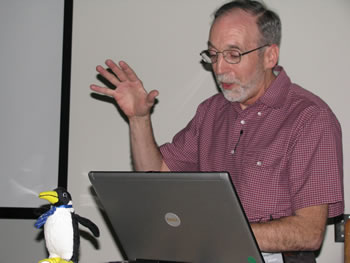
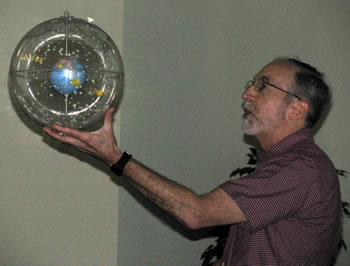
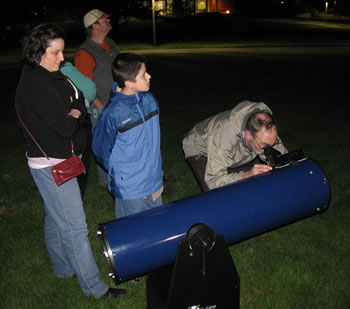
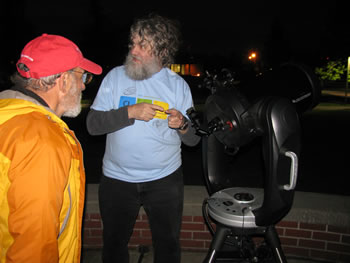
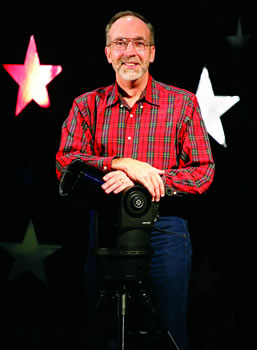 A native of the Pacific Northwest, Dick Shamrell received an appointment to the United
States Air Force Academy from Senator Mark O. Hatfield and graduated with a bachelor
of science degree in physics. After receiving pilot training at Laughlin Air Force
Base in Del Rio, Texas. Shamrell served as an instructor pilot at Laughlin. He
went on to earn a master of arts degree in management and human relations from Webster
University.
A native of the Pacific Northwest, Dick Shamrell received an appointment to the United
States Air Force Academy from Senator Mark O. Hatfield and graduated with a bachelor
of science degree in physics. After receiving pilot training at Laughlin Air Force
Base in Del Rio, Texas. Shamrell served as an instructor pilot at Laughlin. He
went on to earn a master of arts degree in management and human relations from Webster
University.